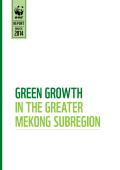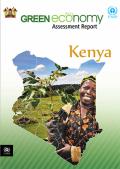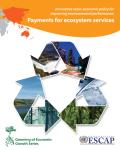
Mekong countries remain relatively well-endowed in natural capital, but signs of pressure and stress on the region’s natural capital are becoming more apparent alongside rapid rates of growth and market development. Escalating land, resource and infrastructure demands arising from urbanization and industrialization combined with a rapidly growing human population means that biodiversity and ecosystem services in the Mekong countries currently face unprecedented threats. At the same time, climate change is affecting ecological productivity and economic vulnerabilities in ways that may encourage even greater pressures on the natural system and cause progressively greater stresses to human and economic systems.
In this paper, the authors explore the many successful strategies and measures for climate resilience and low carbon development that communities and leaders have pursued at the subnational level. They draw on the rich and practical experiences of CDKN’s project partners and the broader ICLEI network.
They argue that the battle for climate compatible development will be won or lost in provinces, districts and cities. There are distinct challenges at subnational level– for example, future climate data for local and subnational levels is more uncertain than at larger scales, and subnational decision-makers face intense local pressure to act on the negative impacts of climate extremes and disasters. There are also unique opportunities. Subnational decision-makers often have a sound understanding of climate trends in their area, based on first-hand experience and local and indigenous knowledge. They have a good sense of solutions that are effective in the local context and they have the ability to mobilise local resources for implementation, including people’s time and knowledge.
Climate-related disasters have inflicted increasingly high losses on developing countries, and with climate change, these losses are likely to worsen. Improving country resilience against climate risks is therefore vital for achieving poverty reduction and economic development goals.
This report discusses the current state of knowledge on how to build climate resilience in developing countries. It argues that climate-resilient development requires moving beyond the climate-proofing of existing development pathways, to consider economic development objectives and resilience priorities in parallel. Achieving this will require political vision and a clear understanding of the relation between climate and development, as well as an adapted institutional set-up, financing arrangements, and progress monitoring and evaluation. The report also discusses two priorities for climate-resilient development: disaster risk management and the involvement of the private sector.
This report focuses on the wind and solar PV sectors in India. It reviews the Indian policy framework for increasing the share of renewables in the energy mix within the context of multiple social, economic and technological objectives. Based on this analysis, it concludes that while support to the industry has come at a relatively low cost, development has been slow and many policies have been found wanting when evaluated against the originally proposed goals.
The report suggests that ‘green ’rather than ‘industrial’ elements have been best supported by policy to date. Impacts are most clearly seen in energy security and access, avoided health costs and the abatement of greenhouse gas emissions, while the industrial policy element has fared poorly in comparison. Marrying the two elements more completely will allow the benefits of a renewable energy manufacturing sector and environmental protection to be successfully realized.

Kenya has one of the most dynamic economies in Africa, yet it is facing a number of pressing economic, environmental and social challenges. In recent years, Kenya has adopted several green economy-related approaches and policies, which include implementing renewable energy feed-in tariffs in 2008, embedding sustainable natural resource utilization into its 2010 Constitution and mainstreaming green economy in its Second Medium Term Plan (2013-2017).
In this context, the Ministry of Environment, Water and Natural Resources, in partnership with UNEP, commissioned a study to assess the economic benefits and challenges of investing in priority economic sectors in support of Kenya’s transition to a green economy. The study examines investments under “business-as-usual” (BAU) compared to green economy scenarios in four key sectors that are critical for the country’s green growth, namely: agriculture, energy, manufacturing and transport.
This publication informs policy makers and practitioners involved in developing and monitoring green growth strategies. It proposes a framework for green growth indicators that seeks to respond to the context of developing countries and their expressed policy needs. The proposed framework for green growth indicators is based on a wider concept of quality of growth, and puts attention on five main dimensions of economic development - equity and inclusiveness; efficiency and productivity; structural transformation; investment in natural capital; and planetary boundaries. ESCAP’s framework aligns with previous work on green economy and green growth indicators with particular attention to inequality and access to basic resources. It recognizes the need to assess and mitigate risks – to set targets to ensure that economic activity and its resource use consequences stay within planetary limits. The importance of governance for each element of the framework is also emphasized.
The 2012 United Nations Conference on Sustainable Development (Rio+20) emphasized the need for a balanced integration of the three dimensions of sustainable development. This publication responds to this call. It advocates a transformation in economic growth strategies and its underlying economic theories – a shift from a focus on quantity of economic growth, to quality of growth. Short-term growth strategies aimed at maximizing GDP growth has created a “vicious cycle” - growth driven by the exploitation of human and natural capital.
Financial constraints are among the most important barriers to proper municipal solid waste (MSW) management in the developing countries of Asia and the Pacific. The reform of fiscal measures and the adoption of economic instruments could help local governments by increasing revenue, causing MSW management authorities in the region to attempt to recover costs by levying fees for their services. However, the polluter pays principle is not easy to enforce in countries where the population has never paid the actual cost of public services aimed at mitigating environmental damage. Since it directly affects their available income, local people often do not understand why they should pay for these services while at the same time, rising public awareness of environmental issues is making it more difficult to implement low-cost solutions, such as the creation of new disposal sites. The fermentation of waste in open dumps and landfills generates landfill gas (LFG), a major component of which is methane, a powerful greenhouse gas (GHG). Proper management of MSW which includes utilizing this LFG, can thus contribute to climate change mitigation.

For an economy to “grow green”, investments must be made in natural capital. Natural capital provides both “direct” ecosystem services such as the provision of food and raw materials, and “indirect” ecosystem services such as carbon sequestration, watershed protection, aquifer recharge and biodiversity habitat provision. Ecosystem services support human economies and societies. They are usually irreplaceable, or can only be substituted for at great cost. The savings achieved by protecting natural capital can provide convincing economic, in addition to the well-known environmental arguments, for sound environmental management. Incentives for sustainable management of ecosystems through payments for ecosystem services (PES) can boost action on sound ecosystem management.
Energy poverty - lack of access to electricity and reliance on traditional fuels for cooking and heating - remains an enduring problem. Globally, more than a billion people live without electricity and, nearly three billion depend entirely on wood, charcoal and dung for other domestic energy needs. Their search for energy fuels and services is an arduous, daily grind. Lack of access to modern energy has a broad impact. It not only limits economic opportunities for income generation and blunts efforts to escape poverty; but it also severely impacts living conditions for women and children and contributes to global deforestation and climate change. In a business-as-usual scenario, by 2030, the estimated number of deaths from dependence on traditional fuels will likely be greater than those individually from malaria, tuberculosis and HIV/AIDS, underscoring the necessity of finding more sustainable forms of energy supply.
